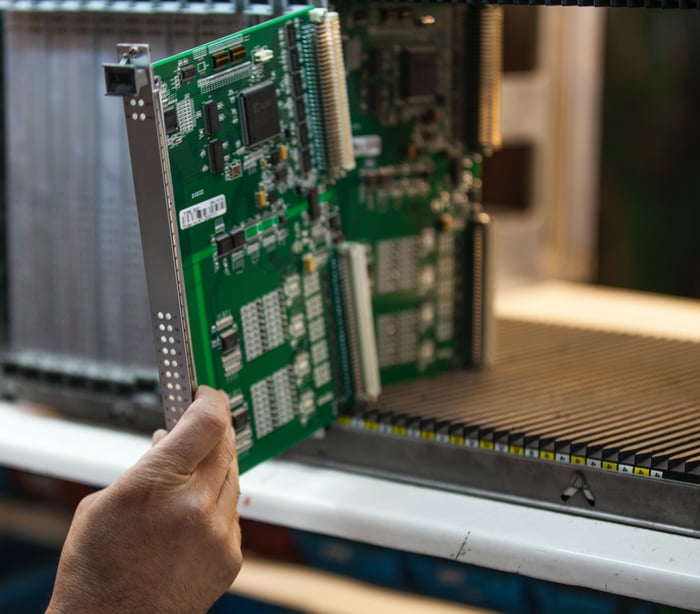In the April Sensible semiconductor news update, we’ve rounded up some of the top new stories impacting the electronic components industry:
- Auto Processor Market to Reach $12.7 Billion in 2028
- Intel and Merck Fund Academic Research of Sustainable Semiconductor Manufacturing
- IPC Unveils Sustainability for Electronics Leadership Council
- New Fabrication Process Makes Flexible Supercapacitors with Higher Energy Storage
- Researchers Claim Room Temperature Superconductor Development
- US Indicates Intent to Hold Developers Liable for Ensuring IoT Devices
- Industry Concerns About US-China Relationships
- Netherlands Restricts Semiconductor Experts to China
- R&R World Awards Program Now Open for Submissions
Auto Processor Market to Reach $12.7 Billion in 2028
According to the Yole Group, ADAS, and cockpit processors are growing at a rate of 13% CAGR and are forecast to reach $12.7 billion by 2028. While some OEMs have signaled they may build their own custom processors, most are expected to form partnerships or employ co-design strategies.
Intel and Merck Fund Academic Research of Sustainable Semiconductor Manufacturing
The two industry giants announced funding for academic research into the development of more sustainable manufacturing processes for semiconductors. EU research groups are invited to apply starting in Q2 2093. Focusing on new technologies and industry collaborations, the program hopes to leverage AI and machine learning technologies in high-volume manufacturing.
Merck has said publicly that it intends to become climate-neutral by 2040.
IPC Unveils Sustainability for Electronics Leadership Council
Several major manufacturers and tech companies will join together as part of IPC’s new leadership council on sustainability. Announced so far are:
- AT&S
- Altium
- BAE Systems
- Flex
- Intel
- Jabil
- NGC
- Siemens
- TTM Technologies
- Zollner
IPC hopes cross-industry representation from printed circuit board design and manufacturing companies, electronics manufacturers, and OEMs can create a roadmap for industry sustainability.
New Fabrication Process Makes Flexible Supercapacitors with Higher Energy Storage
Researchers in South Korea report the development of a new fabrication process for making flexible supercapacitors on paper, using multiple gold electrodes to create high-density energy storage devices.
This new process creates supercapacitors with high foldability, good mechanical strength, and low electrical resistance. The supercapacitor can retain storage capacity through 6,000 charge-discharge cycles, according to the researchers.
Researchers Claim Room Temperature Superconductor Development
Researchers at the University of Rochester say they have created a room-temperature superconductor that can operate with zero resistance even under high pressure and high temperatures. Such a breakthrough would be welcomed by the industry. Zero resistance would allow current flowing through a superconductor to never lose energy.
The news was met with skepticism from many industry analysts and researchers. For example, Jorge Hirsch, a physicist at the University of California told Electropages in an article titled Superconductors at Room Temperature: Fact or Fiction: “There is a lot of evidence for superconductivity here if you take it at face value. But I do not believe any of what these authors say. I am not sold at all.”
US Indicates Intent to Hold Developers Liable for Ensuring IoT Devices
The Biden administration unveiled its National Cybersecurity Strategy, which appears to hold manufacturers and developers accountable for ensuring the security of IoT devices and software.
In its five-part plan, the White House announced that the industry has a responsibility to shape the market forces to drive security and resilience.
“We will place responsibility on those within our digital ecosystem that are best positioned to reduce risk and shift the consequences of poor cybersecurity away from the most vulnerable in order to make our digital ecosystem more trustworthy.” — White House Statement
This includes “shifting liability for software products and services to promote secure development practices.”
Industry Concerns About US-China Relationships
Some leaders in the chip industry are expressing concerns about the degradation of the US-China trade relationship and its impact on innovation. Others are remaining quiet, hoping to benefit from the $52 billion in grants included in the US CHIPS Act.
Matt Hamblen, the editor of Fierce Electronics, suggests the issue is so sensitive that many manufacturers fear speaking up.
Netherlands Restricts Semiconductor Tech to China
The Netherlands announced it will join the US in placing new restrictions on exports of semiconductor technology exports to China to protect national security.
“Because the Netherlands considers it necessary on national security grounds to get this technology into oversight with the greatest of speed, the Cabinet will introduce a national control list,” wrote Dutch Trade Minister Liesje Schreinemacher in a letter to Parliament.
Global Chip Market in “Free Fall”
According to the Semiconductor Industry Association (SIA) report, the global chip market fell 18.5% in January after falling 14.7% and 9.2% in previous months Peter Clarke wrote in eeNews that “the pace of the market contraction is slowing but there is no clear sign yet of the market reaching the bottom or how long it might languish there.”
China, which bought more than a third of the world’s chips last year, has seen significant downward movement along with other locations in Asia and the US. European and Japanese chip markets, however, are continuing to expand at modest levels of less than 1% per year.
“Despite record-high sales in 2022, the global semiconductor market cooled considerably during the second half of the year, and that trend continued during the first month of 2023,” according to John Neuffer, SIA’s CEO via statement.
R&R World Awards Program Now Open for Submissions
The program is open to corporate, government, and academic organizations globally. First established in 1963, the R&D 100 Awards recognizes new commercial products, materials, and technologies in categories including:
- Analytics and testing
- IT and electrical
- Mechanicals and materials
- Processes and prototyping
- Software and services
- Other products or services that do not fall into other categories
There will also be several special recognition awards, including:
- Corporate responsibility
- Green tech
- Market disruptor products
- Market disruptor services
- Innovation while battling COVID
Stay Up-to-Date on Semiconductor News with Sensible Micro
The Sensible Micro team has deep industry connections and is always on the look for electronic component news to help you manage your business. Our robust global network often enables us to access critical insights early, even before many OEMs and manufacturers.
Stay informed with Sensible Micro with the electronic components industry news you need to prepare for what’s ahead.
News Sources:


















